Google "Gets You" vs Google "Sees You as Famous": What’s the Real Difference?
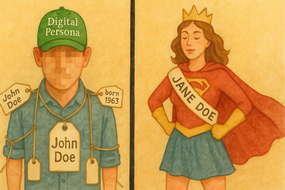
Google "gets you" when it can collect consistent information for your digital persona [1]. When it finds enough information, Google includes you in the Google knowledge graph.
Google "sees you as famous" means that a search for your name triggers a knowledge panel [2] in the search engine results page [3] (SERP). A knowledge panel and knowledge cards [4] are rich search results with facts highlighted.
Google elevates your personal brand when it recognizes a query as your name and can assign it to a person in the knowledge graph. This essentially makes you famous. Gogole sees you as the dominant person with that name in the context of the person doing the search.
For Google to make you famous, it first needs to "get you."
In order to "get you", you need to teach Google enough information about you so it has confidence in your identity. You can check which identities Google assigns to your name by using the Google Knowledge Graph API.
Furthermore, Google needs to understand the context in which you are notable. So it can match the context of the searcher to your context. Context attributes, such as the searcher's location and previous search history, influence whether Google surfaces a Brazilian researcher or an American baseball player with the same name.
What Does It Mean When “Google Gets You”?
Google "gets you" when it has created an entity in its knowledge graph for your name and with the type person.
Google announced in 2012 that it now understands the words on the web not just as a sequence of characters, but their semantic meaning. That means when Google's crawlers read a webpage, they try to extract "things" called entities. Furthermore, they try to understand simple statements such as "Kaj Kandler works for Entity Garden."
Google assesses these simple statements and looks for different sources for the same statement. When it finds such a statement corroborated, it includes it in a special database, called a knowledge graph. Besides corroboration, Google measures HTML links and co-occurences of words in the source and target context to assess the validity of a statement.
Google collaborated with other search engines on a set of statements it is looking for specifically. This set of rules for structured data is published at schema.org. Schema.org also provides a markup language that allows publishers to formally repeat the statements in the text of the page. Schema.org gives us an idea of what kind of data Google stores in its knowledge graph.
Furthermore, Google provides an API to query the knowledge graph for "things." This API allows us to query the name of a person and see if it is recognized as a thing, a person, or unknown. This API is very limited because we can not query relationships, such as "works for", nor does it provide these in the result set. However, it provides for any result a special URL that is a query to Google Search. This query can show us what Google knows about the person and displays it in the context of the user.
In short, Google "gets you" if you find an entity in the knowledge graph API that has your name and shows some search results related to you.
What Happens When “Google Sees You as Famous”?
Google "sees you as famous" when a search for your name triggers a knowledge panel or knowledge cards in the search engine results page [3:1] (SERP).
When Google connects a search query to an entity in its knowledge graph it shows additional information from its knowledge graph. Typically, it displays name, image, descriptions, home page, and sometimes social links or related entities.
Google only does this when it believes that the searcher is looking for this entity or person as opposed to other entities with the same name. Google recognizes the dominance of one entity over all others associated with this name based on context.
As context, Google strongly considers the location of the searcher. Based on the country, the same name may trigger different people or none at all.
Google further considers an individual's search history to determine if a name should trigger entity results.
When Google triggers results from the knowledge graph, it adds a headline with the name of the person, followed by a menu of three vertical dots. From this menu, you can select a "share" URL, which leads to the display of the entity search results. Often, but not always, the results in the name search and the entity are identical.
In rare cases, the entity URL displayed through the three-dot menu can not be retrieved through the Google Knowledge Graph API.
Tip:
It is a good idea to take note of the knowledge graph URL for further reference or to track it over time.
TL;DR
- To "be seen as famous" by Google, Google needs to "get you"
- If a "name search" triggers a knowledge panel or knowledge cards depends on context
- That Google "gets you" is not sufficient for Google to "make you famous."
- You compete with namesakes for Google's (and the searchers') attention
Google "Gets you" vs Google "sees you as famous": Key Differences
The main difference between Google "gets you" and "shows you as famous" is the public visibility of your digtal persona.
When Google gets you it has identified you as a person with an identity and collects information about you.
When Google show syou as famous, it has determined that someone searching for your name is looking for that information.
| Google "gets you", when | Google "shows you as famous", when |
|---|---|
| Knowledge Graph API returns a relevant entry | Google Search shows your digital persona |
| Your entry has an ID | Search results have a name and a three dot menu |
| Your entry has a description | Search results show short description below the name |
| Your entry has a detailed description | Search results show an About section in the knowledge panel |
| Knows [5] about your age | Displays a knowledge card with your age |
| Knows [5:1] about relation to another entity, such as a book you published | Displays a link to the knowledge panel of your book |
| Data collection depends on ability to extract information and structured data markup | Result depends on query is classified as name of an entity |
| Data is filtered by trustworthiness of the source | Result is assessed by location context of the searcher |
| Data is filtered by corroboration through multiple sources | Dominance between competing results is determind by search volume and user feedback |
| Data is clustered by corroboration through links | Information is filtered by likely relevance to the user |
As with all searches, Google considers the context of the searcher to determine if your an entry in the knowledge graph is the most relevant answer to the query.
What Triggers a Knowledge Panel?
Google triggers a knowledge panel [2:1] when it has an entity by that name, and it is confident that in the searcher's context, this is the most relevant entity.
Google must collect authoritative information about an entity in order to create an entry in the knowledge graph. Google especially trusts reputable websites such as Wikipedia / Wikidata or a personal home page. It verifies this data through mentions of the same facts and links between websites.
The more relevant mentions and links a person has, the stronger Google can assemble a digital persona in the knowledge graph. Google looks for quantity but also quality to assign the right information to the right person.
The second big factor is search volume for your name. If no one searches for your name, Google thinks you don't matter to the world. The more notable you are the mor elikely it is Google will trigger your knowledge panel in the SERP.
How to teach Google about yourself?
The best way to teach Google about yourself is to create a digital persona hub [^digital_persona_hub]. A digital persona hub is a website that is a comprehensive source of information about you. It functions as a hub with links to all sources that corroborate this information. Ideally, all your other profiles link back to this hub page.
Ideally, your digital persona hub is a personal website, but a corporate about page or a social media profile can serve as the hub page. But this is not recommended.
Also consider publishing information that strengthens your relevance in the context factors. Remember context id built from location, relations to other entities, and topics you demonstrate expertise in.
As for social profiles, they have minor effect if they appear dormant. Active social profiles can provide rich context and facts for a digital persona.
Examples for people triggering knowledge panels
Rebecca Yarros - American Author
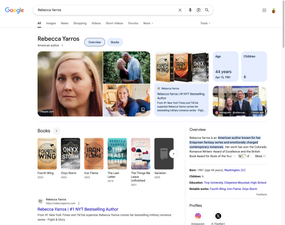
Rebecca Yarros is a best-selling American author. Her knowledge panel is rich in information, and she gets additional panels for her books in the SERP.
Authors easily trigger knowledge panels because they have search volume. Through their books, they have lots of public information and mentions.
David Baszucki - CEO of Roblox Corporation
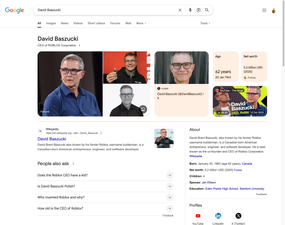
Davis Baszucki is the founder and CEO of Roblox. His knowledge cards is rich in images from events, and information such as age and net worth.
CEOs trigger knowledge panels often because they appear in conferences and press releases. They may be known for their relations to their corporation, other executives, as well as industry and charitable events.
Paula Carolina - Musical Artist
Paula Carolina is an up-and-coming musical artist. Her knowledge cards show photos from her albums and her main website. Also present in her knowledge panel are links to social profiles. However, personal facts are sparse.
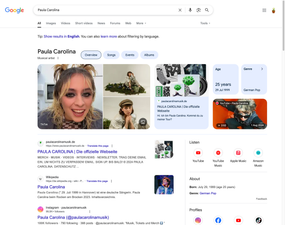
Musicians often trigger knowledge panels because they are popular searches. They also have strong relationships with their songs and albums, as well as managers and music labels that promote their work.
Julia Gisella - German YouTuber
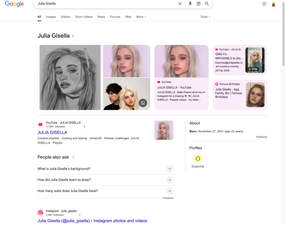
Julia Gisella is a German YouTuber focusing on cooking, baking, and playing Minecraft. Her knowledge panel contains only a small set of images and one social profile. Apparently, Google can not find enough corroborating facts in diverse places to show a fuller picture of her.
Many believe personal branding is a career in itself. They think one social media platform makes them a celebrity. You may gain many followers on a single platform, yet for Google fame, you need to spread the information in more places. Especially, you should publish consistent information that builds a digital persona hub.
Why the Difference Matters for Your Digital Persona
In an internet-connected age, people search for people online. The general public searches for your name. If they find rich knowledge cards and a knowledge panel that is you, they conclude you are a notable person.
If people find someone else with rich results, they are usually frustrated. Most people add something that characterizes the person to the search and try again. They evaluate the results the same way as the first result.
Rich results in Google convey notability and importance.
If you are in a job hunt, notability can clinch your first interview or put you in a better position when it comes to salary and benefits negotiations.
If you are an entrepreneur, Google fame can mean an invitation to a conference or a deal closing faster. Because if Google trusts you, prospects will trust your expertise as well.
As a founder, higher visibility in the search engines can attract partners and key employees to your venture. Because top talent is intrigued by a notable founder.
For building your personal brand online, you want Google to "get you" and to "present you as famous."
How to Move from ‘Google Gets You’ to ‘Google Shows You’
As mentioned above, before Google can show you as famous, Google needs to get you. The first step is to build and manage your digital persona online.
The next step is to trigger the knowledge panel for the right searches. The ultimate goal is to trigger the rich results for the search of your name alone.
However, more detailed searches like "<name> + company" can be more easily targeted. Therefore, your second level is to ensure that Google gets all these relationships.
Common relationships you want to connect yourself to are:
- Any organization you lead or work for
- Any industry association or directory that is applicable to your work or leadership
- Any works, such as books, songs, podcasts, or videos, you have produced or are starring in
- Any article you have authored
- Any press mentions
- Any conference or charity event you participated in
- Any social media profile that you actively use
- The locations where you lived and worked
You want to favor current or recent relations over your historic ones. You also want to favor topics you want to be associated with now and in the future.
If your life does not include many of the relationships listed above, start creating those. For example, start a blog or submit articles to a relevant publication. The more reputable the publication, the more likely it is that Google values the mention there highly. Don't forget to get a link back from the mention or author profile to your digital persona hub.
If you check many of the boxes above, a digital persona audit on Google can reveal that you are up against strong name competition. Maybe you need to "rebrand yourself" by using a less common variation of your name.
Google also allows you to claim your knowledge panel. This is a process of identifying yourself with government ID. By claiming the profile you must prove that you control many of the sources for the information, such as social media profiles. After you claim the knowledge panel, you can also suggest edits if something false slips into your profile.
If you have a strong digital persona in Google knowledge graph, but Google still does not show you as the dominant result, you need to promote searches for your name. Try to achieve mentions through newsworthy content. Try to avoid a link to your hub being included, but include a hook on why people want to search your name.
Conclusion
That Google gets your digital persona is a necessary step on the road to becoming famous on Google.
Being seen by Google as notable has many benefits, such as more career and business opportunities. People use the internet to validate the people they meet and interact with. When you present yourself online and have Google endorse you as the go-to person, then you make it much easier for others to connect with you.
Most importantly, you can teach Google who you are by managing your digital persona. Start with a digital persona audit and build your personal brand online.
A digital persona is the aspect of a personal brand that is shaped by the person's online presence, behavior, and interactions on the internet. ↩︎
Knowledge panels are information boxes that appear on Google SERP when you search for entities (people, places, organizations, or things) that are in the Knowledge Graph ↩︎ ↩︎
The search engine results page, or SERP, is the page you see in response to a query into Google, Bing, Yahoo, or any other search engine. ↩︎ ↩︎
Knowledge cards are a grid of small information cards across the top of the SERP. Knowledge cards are only shown for entities in the Google Knowledge Graph ↩︎
"Knows about" means Google's knowledge graph stores such inforamtion, but it does not reveal it in the API results. ↩︎ ↩︎